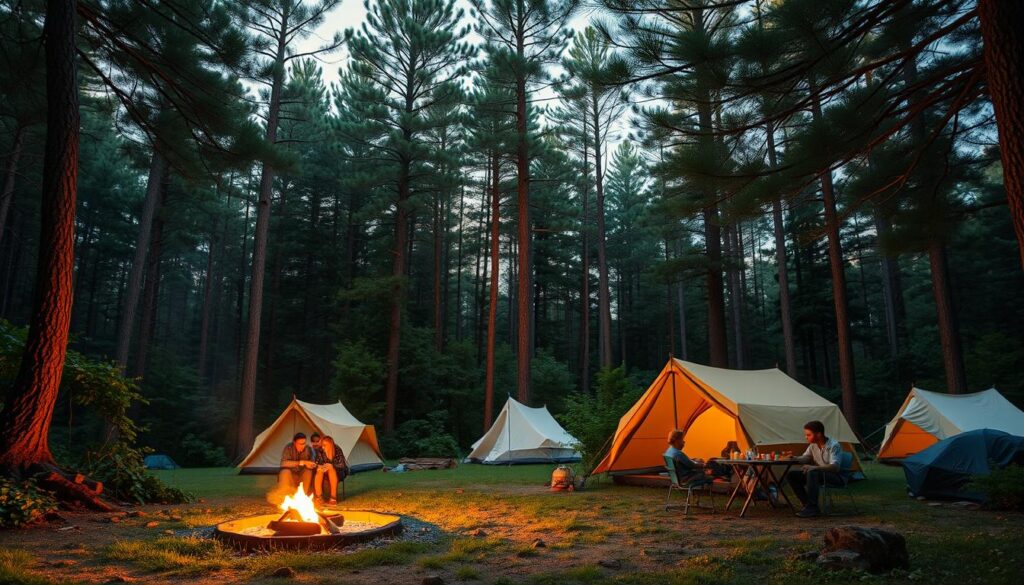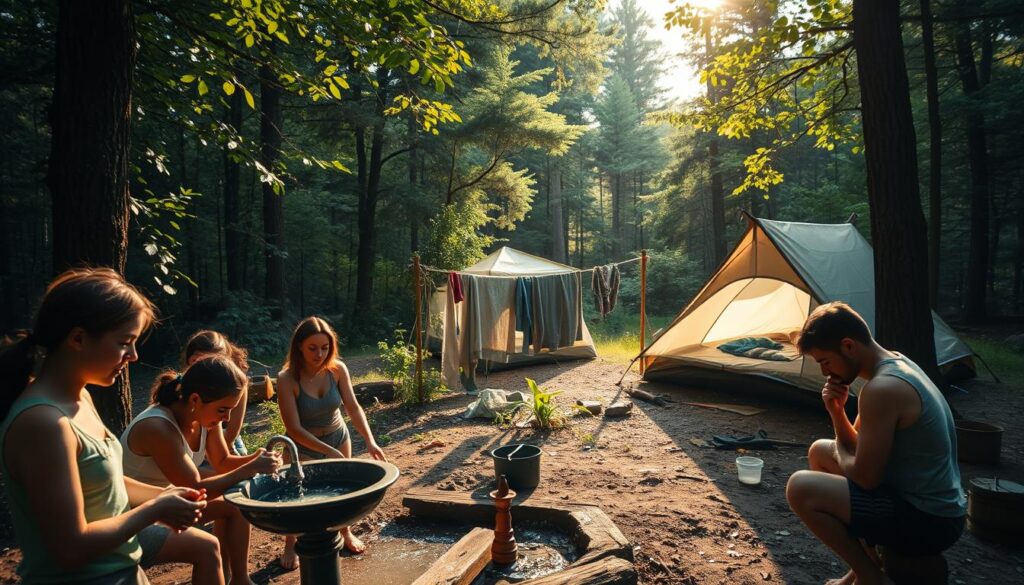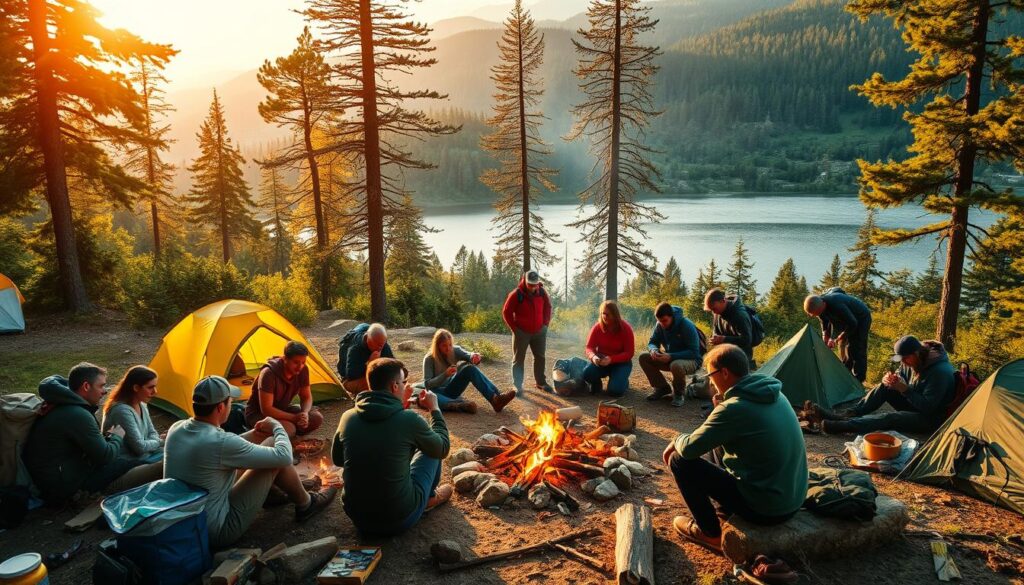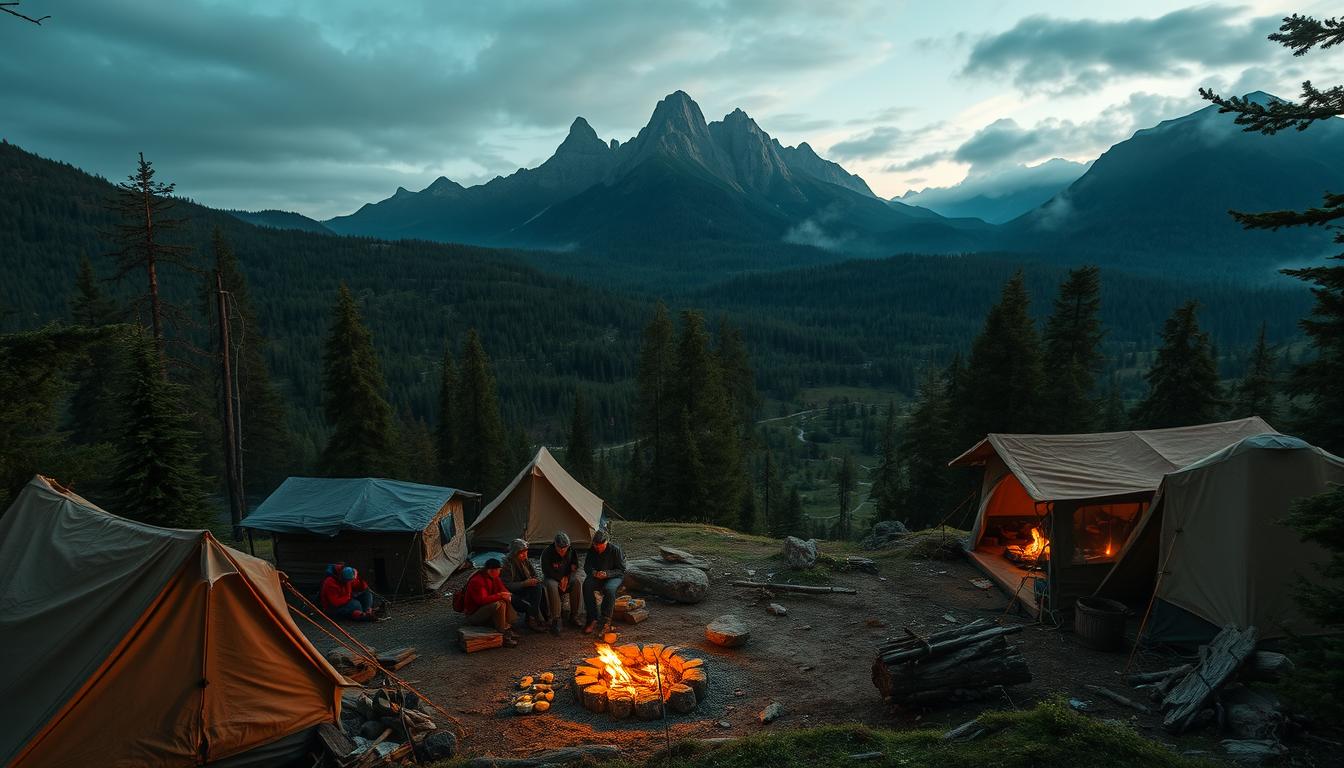For many, camp life is a unique experience that combines adventure, personal growth, and community building. Whether you’re a seasoned camper or just starting out, understanding the realities of campground experiences can greatly enhance your stay.
The journey into the heart of life in the camp involves more than just setting up a tent; it’s about embracing a lifestyle that is both challenging and rewarding. As we delve into the intricacies of campground living, you’ll discover practical tips and insights designed to make your experience as enjoyable as possible.
Key Takeaways
- Understanding the basics of camp life
- Preparing for campground experiences
- Tips for thriving in a camp environment
- Community building and social connections
- Practical advice for a fulfilling stay
Understanding Camp Life: What to Expect
When considering a camping experience, it’s essential to understand the various aspects of camp life. Camping offers a unique opportunity to disconnect from the hustle and bustle of daily life and reconnect with nature and oneself.
Types of Camps and Their Unique Characteristics
Camps come in various forms, each offering distinct experiences. Understanding these differences is crucial for choosing the right camp that aligns with your preferences and expectations.
Recreational Camps vs. Work Camps vs. Wilderness Retreats
| Camp Type | Primary Focus | Typical Activities |
|---|---|---|
| Recreational Camps | Leisure and Fun | Swimming, Arts, Team Sports |
| Work Camps | Community Service | Conservation Projects, Community Development |
| Wilderness Retreats | Survival Skills and Nature | Wilderness Survival, Foraging, Nature Walks |
Common Misconceptions About Camp Living
Many people’s perceptions of camp life are influenced by popular media, which often portrays an unrealistic or exaggerated version of camping experiences.
Reality vs. Popular Media Portrayals
Camp life is not always as glamorous as depicted in movies or TV shows. In reality, it involves hard work, teamwork, and adapting to challenging environments. However, it also offers unique opportunities for personal growth and connection with nature.
By understanding the different types of camps and dispelling common misconceptions, individuals can better prepare themselves for the realities of camp life, embracing the outdoor living experience to its fullest.
Essential Preparations Before Heading to Camp
As you prepare for your camping adventure, it’s crucial to consider the essential preparations that will ensure a smooth and enjoyable experience. Proper planning and preparation are key to a successful camping trip.
Creating Your Comprehensive Packing Checklist
One of the most critical steps in preparing for your camping trip is creating a comprehensive packing checklist. This list should include all the necessary gear and supplies you’ll need during your stay at the camp.
Season-Specific Gear Requirements
The gear you pack will vary depending on the season. For example, in colder months, you’ll need warm clothing, insulated sleeping bags, and potentially snowshoes or other winter gear. In warmer months, focus on lightweight, breathable clothing and sun protection.
Mental and Physical Preparation Strategies
In addition to packing the right gear, it’s also important to prepare yourself mentally and physically for the camping experience. This includes training for physical activities you plan to engage in, such as hiking or kayaking, and mentally preparing for the challenges you may face.
Important Documents and Permissions to Secure
Before heading to camp, ensure you have all necessary documents and permissions. This may include medical clearance forms, permission slips, and any other relevant documentation required by the camp or local authorities.
By taking the time to prepare properly, you’ll be able to fully enjoy your camping adventures and make the most of your campsite activities, enhancing your overall life in the camp.
Setting Up Your Camp Space Effectively
To maximize your camping experience, it’s essential to set up your camp space thoughtfully. A well-organized campsite not only enhances your comfort but also contributes to a safer and more enjoyable outdoor adventure.
How to Choose the Ideal Location for Your Setup
Selecting the right spot for your camp is crucial. Look for a flat area that is away from standing water and potential flood zones. Consider the proximity to amenities like water sources and restrooms if available.
Step-by-Step Guide to Creating a Comfortable Living Area
Start by laying out your tent and securing it properly. Then, organize your gear in a way that maximizes space and accessibility. Use tarps or ground cloths to create a dry and comfortable living area.
Organization Techniques for Limited Space
Effective organization is key in camp settings. Utilize storage bins and hanging organizers to keep your gear off the ground and within reach.
Storage Solutions That Work in Camp Settings
| Storage Solution | Description | Benefits |
|---|---|---|
| Collapsible Containers | Easy to set up and fold away | Saves space, versatile |
| Hanging Organizers | Utilize vertical space in tents or shelters | Keeps gear off the ground, accessible |
| Stackable Bins | Stack on top of each other for maximum storage | Space-efficient, keeps gear organized |
By implementing these strategies, you can create a camp space that feels like a home away from home, enhancing your overall camping experience.
Daily Routines in Life in the Camp
Daily routines play a vital role in making the most of your nature retreat experience. By establishing a structured daily schedule, you can enhance your overall camping experience and create lasting memories.
Establishing Productive Morning Rituals
Starting your day with a productive morning ritual can set a positive tone for the rest of the day. This could include activities such as meditation, journaling, or a brisk walk around the campsite. As noted by outdoor enthusiast, John Muir, “In every walk with nature, one receives far more than he seeks.”
“In every walk with nature, one receives far more than he seeks.” – John Muir
Incorporating such practices into your morning routine can help you connect with nature and prepare for the day ahead.
Structuring Afternoon Activities and Responsibilities
Afternoons at camp can be filled with a variety of activities and responsibilities. It’s essential to strike a balance between leisure and duty. This might involve participating in group activities, attending to personal chores, or simply taking time to relax. By structuring your afternoons effectively, you can make the most of your time and enjoy a sense of accomplishment.
Creating Meaningful Evening Wind-Down Practices
As the day comes to a close, establishing a calming evening routine can help you unwind and prepare for a restful night’s sleep. This could include activities such as reading, storytelling, or practicing gentle stretches. 
Nighttime Safety Considerations
When winding down in the evening, it’s crucial to consider nighttime safety. Ensure that you have adequate lighting around your campsite and that all campfires are fully extinguished before retiring for the night. By taking these precautions, you can enjoy a peaceful night’s sleep, ready to face another day of camping adventures.
Mastering Nutrition and Meal Planning at Camp
Camping doesn’t have to mean compromising on nutrition; with the right planning, meals can be both healthy and enjoyable. Effective nutrition is crucial for maintaining energy levels and overall health during life in the camp.
Food Storage Techniques for Safety and Freshness
Proper food storage is essential to keep your meals fresh and safe from spoilage. Use airtight containers and keep them in shaded areas or coolers to maintain the quality of your food. This is particularly important when engaging in campsite activities that require a lot of energy.
10 Simple and Nutritious Camp Recipes Anyone Can Make
Camp meals don’t have to be bland or repetitive. Here are a few simple recipes: Grilled chicken with vegetables, one-pot pasta, and trail mix with nuts and dried fruits. These meals are not only nutritious but also easy to prepare, making them perfect for outdoor living.
- Grilled chicken with roasted vegetables
- One-pot pasta with marinara sauce
- Trail mix with nuts and dried fruits
How to Participate in Communal Cooking
Communal cooking is a great way to share meal responsibilities and learn new recipes. To participate effectively, be prepared to contribute ingredients and help with cooking and cleaning duties. This fosters a sense of community and makes life in the camp more enjoyable.
Mealtime Etiquette in Camp Settings
Mealtime etiquette is crucial in camp settings to ensure everyone has a positive dining experience. Be respectful of others, clean up after yourself, and contribute to meal planning and preparation. This helps maintain a harmonious and enjoyable campsite activities environment.
Maintaining Hygiene and Health in Rustic Conditions
Maintaining personal hygiene and health is crucial when living in rustic camp conditions. The lack of modern facilities can pose significant challenges, but with the right strategies, campers can stay healthy and comfortable.

Personal Cleanliness Routines Without Modern Facilities
Establishing a personal cleanliness routine is vital in a camp setting. This can include using baby wipes or biodegradable soap for bathing, washing clothes in a nearby stream or bucket, and maintaining oral hygiene with a portable toothbrush and toothpaste.
For hand hygiene, using hand sanitizer or washing hands with soap and water before meals and after using the bathroom is essential. Keeping a clean living area also contributes to overall health.
Essential First Aid Skills for Camp Living
Having basic first aid skills is indispensable in a camp environment. Campers should know how to treat minor injuries such as cuts, scrapes, and burns. A well-stocked first aid kit should include bandages, antiseptic wipes, pain relievers, and any personal medications.
Understanding how to recognize and respond to more serious conditions like allergic reactions or dehydration is also crucial. Regular first aid training can prepare campers for emergencies.
Preventing and Managing Common Camp Health Issues
Common health issues in camps include gastrointestinal problems, insect bites, and exposure to the elements. Preventive measures include storing food properly, using insect repellent, and wearing appropriate clothing for the weather.
Managing these issues involves staying hydrated, resting when needed, and seeking shade or shelter from extreme weather conditions.
When to Seek Professional Medical Help
It’s essential to know when a health issue requires professional medical attention. Signs that necessitate seeking help include severe symptoms, high fever, difficulty breathing, or worsening conditions despite self-care.
Having a plan for emergency situations, including knowing the location of the nearest medical facility and having a means of communication, is vital for campers.
Building Strong Community and Social Connections
Camping is not just about connecting with nature; it’s also about building a community. When we embark on camping adventures, we open ourselves up to new experiences and people.
Techniques for Establishing Positive Relationships
Establishing positive relationships while on a nature retreat involves being approachable, respectful, and genuinely interested in getting to know others. Simple actions like sharing meals or participating in group activities can foster a sense of camaraderie.
Effective Conflict Resolution in Close Quarters
Living in close quarters during outdoor living experiences can sometimes lead to conflicts. Effective resolution involves active listening, empathy, and a willingness to compromise. By addressing issues promptly and respectfully, campers can maintain a harmonious community.
Ways to Contribute to Camp Community Spirit
Contributing to the camp community spirit can be achieved through various means, such as participating in communal tasks or organizing group activities. One effective way is by:
- Sharing skills or knowledge with others
- Participating in or organizing group games and events
- Supporting fellow campers in their tasks or projects
Organizing Inclusive Group Activities
Organizing inclusive group activities is a great way to ensure everyone feels involved. This can include planning group hikes, campfire gatherings, or other communal events that cater to a wide range of interests.
| Activity Type | Description | Benefits |
|---|---|---|
| Group Hikes | Exploring nature together | Promotes teamwork and appreciation for nature |
| Campfire Gatherings | Sharing stories and experiences | Fosters bonding and creates lasting memories |
| Communal Tasks | Working together on camp chores | Encourages cooperation and a sense of responsibility |
Engaging in Outdoor Activities and Skill Development
Engaging in outdoor activities is a crucial part of the camp experience, offering numerous opportunities for skill development and personal growth. Campers can participate in a variety of activities that not only enhance their outdoor skills but also promote a deeper appreciation for nature.
Guided Nature Exploration Practices
Guided nature walks and exploration activities help campers understand and appreciate the natural environment. These practices encourage campers to observe local wildlife, identify different plant species, and learn about ecological conservation.
- Nature scavenger hunts
- Guided forest walks
- Wildlife observation sessions
Essential Survival Skills Worth Learning
Learning essential survival skills is a vital part of the camp experience. Campers can acquire skills such as building shelters, starting fires, and navigating using a compass.
Key survival skills include:
- Building shelters using natural materials
- Starting fires without modern tools
- Navigation techniques using a compass and map
Recreational Activities for All Weather Conditions
Campsite activities are not limited by weather conditions. Campers can enjoy a range of recreational activities, from outdoor games to arts and crafts, regardless of the weather.
Adapting Games and Sports for Camp Settings
Traditional games and sports can be adapted to suit the camp environment. For example, setting up an obstacle course or organizing a nature-based treasure hunt can be exciting ways to keep campers engaged.

Overcoming Common Challenges of Camp Living
Camp living, while adventurous, presents several common difficulties that can be overcome with the right mindset and strategies. Whether you’re a seasoned camper or new to outdoor living, understanding how to navigate these challenges is key to a successful campground experience.
Weather-Related Difficulties and Practical Solutions
One of the most significant challenges campers face is dealing with unpredictable weather. Rain, wind, and extreme temperatures can all impact the camping experience. To mitigate these effects, it’s essential to pack appropriately and have a plan in place for shelter and warmth.
For instance, bringing a waterproof tent and a warm sleeping bag can make a significant difference. Additionally, staying informed about weather forecasts can help you prepare for potential weather-related challenges.
“The clearest way into the Universe is through a forest wilderness.” – John Muir
Managing Homesickness and Emotional Adjustment
For some, camp living can lead to feelings of homesickness or emotional distress, especially when far from family and friends. Establishing a daily routine that includes meaningful activities and staying connected with loved ones through letters or scheduled calls can help alleviate these feelings.
Engaging in communal activities or finding a buddy within the camp community can also provide emotional support and help in adjusting to the new environment.
Creative Problem-Solving with Limited Resources
Camp living often requires improvising with limited resources. This can range from repairing gear to finding creative ways to stay entertained. Developing a mindset that views challenges as opportunities for growth can enhance the camping experience.
- Utilize natural resources for entertainment, such as nature walks or star gazing.
- Learn basic repair skills for common camping gear.
- Engage in communal cooking to share recipes and cooking techniques.
Building Resilience Through Camp Experiences
Perhaps one of the most valuable aspects of camp living is the opportunity to build resilience. By facing and overcoming challenges, campers can develop a stronger sense of self and a more positive outlook on adversity.
Embracing the challenges of camp living with a positive attitude not only enhances the camping experience but also fosters personal growth and resilience that can benefit many areas of life.
Implementing Sustainable Practices for Responsible Camping
Embracing sustainable camping practices is essential for preserving the natural environments we enjoy. As campers, we have a responsibility to minimize our impact on the land and its inhabitants.
Applying Leave No Trace Principles in Daily Camp Life
One of the core principles of sustainable camping is Leave No Trace. This involves disposing of waste properly, minimizing campfire impacts, and respecting wildlife. By following these guidelines, we can significantly reduce our footprint.
Creating Eco-Friendly Camp Solutions
Campsite activities can be made more eco-friendly by using reusable containers and utensils, choosing sustainable camping gear, and conserving water. These simple changes can make a significant difference.
Guidelines for Respectful Wildlife Interaction
When interacting with wildlife during a nature retreat, it’s crucial to keep a safe distance and not feed the animals. This helps protect both humans and wildlife, ensuring a safe and enjoyable camp life for everyone.
Conclusion: Embracing the Full Camp Experience
As you settle into life in the camp, you’ll discover that the camp lifestyle offers a unique blend of adventure, personal growth, and connection with nature. By understanding what to expect and being prepared, you can make the most of your outdoor living experience.
From setting up your camp space effectively to maintaining hygiene and health in rustic conditions, every aspect of camp life contributes to a rewarding experience. Embracing daily routines, mastering nutrition, and engaging in outdoor activities will help you thrive in this environment.
By applying the principles outlined in this guide, you’ll be well on your way to embracing the full camp experience. Whether you’re looking to challenge yourself, build strong community bonds, or simply enjoy the beauty of nature, camp life has something to offer. With the right mindset and preparation, you can turn your camp experience into a truly enriching adventure.
FAQ
What are the most essential items to pack for a camping trip?
When preparing for a camping trip, it’s crucial to pack essentials such as a tent, sleeping bag, sleeping pad, clothing suitable for varying weather conditions, a first aid kit, flashlight or headlamp, and personal hygiene items. Don’t forget to include a water filter or purification tablets, a camping stove or cooking equipment, and a map of the area.
How can I stay safe while camping in the wilderness?
To stay safe while camping, always inform someone of your itinerary and expected return time. Be aware of your surroundings, including potential hazards like wildlife, steep slopes, and inclement weather. Keep a first aid kit handy, and know how to use the items in it. Bring a map, compass, and GPS device or app, and know how to navigate with them.
What are some simple and nutritious meal ideas for camping?
Camping meals can be simple yet nutritious. Consider one-pot dishes like chili or stew, grilled meats or vegetables, and sandwiches. Don’t forget to pack plenty of fruits, nuts, and energy bars for quick snacks. When planning meals, think about food storage and handling to maintain safety and freshness.
How can I maintain personal hygiene while camping without modern facilities?
Maintaining personal hygiene while camping involves using baby wipes or hand sanitizer for cleaning, bringing a portable toilet or knowing how to properly dig a cathole for waste disposal, and using biodegradable soap for washing. Consider packing a small towel and toothbrush, and be mindful of water sources to prevent contamination.
What are some effective ways to build a sense of community while camping?
Building a sense of community at camp can be achieved by participating in group activities, sharing meals, and engaging in communal tasks like cooking or setting up camp. Be open to meeting new people, and consider organizing or joining group games or outings. Showing respect and kindness to fellow campers can go a long way in fostering a positive community spirit.
How can I deal with homesickness or emotional adjustment while at camp?
Dealing with homesickness or emotional adjustment at camp involves staying connected with loved ones through letters or scheduled calls, engaging in activities that bring you joy, and focusing on the positive aspects of your camping experience. It’s also helpful to talk to camp counselors or fellow campers about your feelings.
What are some eco-friendly practices I can implement while camping?
Implementing eco-friendly practices while camping includes following Leave No Trace principles, such as minimizing waste, using biodegradable products, and respecting wildlife habitats. Consider bringing a reusable water bottle, using solar-powered chargers, and packing out what you pack in.
How can I prepare for and respond to weather-related difficulties while camping?
Preparing for weather-related difficulties involves checking forecasts before heading out, packing appropriate gear for various conditions, and knowing how to secure your campsite. In case of severe weather, have a plan for seeking shelter, and stay informed through a weather radio or app.

